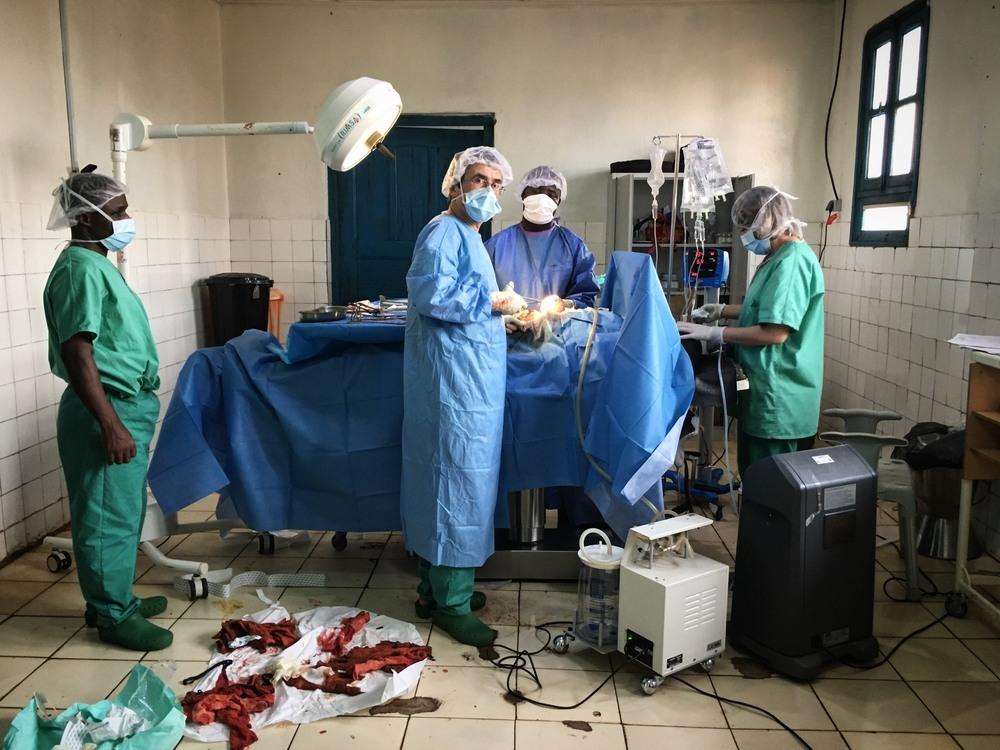Katie Treble, 31, is a doctor from the UK. She was working in the Doctors Without Borders/Médecins Sans Frontières (MSF) hospital in Bria, Central African Republic (CAR), during the weekend of March 24, 2017, when heavy fighting broke out and MSF received 24 wounded people in three days. Here, she describes the experience.
"The hospital’s small triage area was overwhelmed with patients, all with severe gunshot wounds. They were young men who had suffered injuries to their heads, necks, faces, or limbs, and one man had his intestines spilling out of his abdomen. The first thing we had to do was kick a huge number of bystanders out, to make room to assess who needed treatment most urgently.
We had already planned for this situation, but it was my first time dealing with a mass casualty event in real life. The process sounds simple—work out who needs what, when, and keep everything as organized as possible—but in the chaotic reality of an event like this, if order disintegrates it can be the difference between life and death for those who need treatment.
Rapid Assessment
My first job was to perform a rapid assessment and assign each patient a color: red for those with immediately life-threatening injuries, yellow for those needing treatment semi-urgently, and green for the 'walking wounded.' Black is for those who have already died, or whose injuries are so severe they cannot be saved.
With all the staff working together we were able to quickly clear a ward to make room for those in the red category. Our surgeon took the first case straight to the operating theater while we got to work stabilizing the others. More wounded kept arriving during this time, so we had to shuffle the order of those in the queue for the operating theater.
I was nervously keeping an eye on the blood bank—Bria is a small hospital with very limited supplies, and we didn't know how many more patients we could anticipate that night. To transfuse all our supply of blood into someone who might die anyway, and leave no blood for anyone else, is a tough call to make under pressure.
"The Atmosphere Throughout the Whole Weekend Was One of Eerie Calm"
One patient who stood out for me that weekend was a three-year-old girl. She had been shot in the hip and was carried in by about 15 members of her family. She was incredibly calm, and lay quietly, not crying, co-operating with us even though she couldn't understand why we wanted to prick her with needles and keep touching her painful wound. The atmosphere throughout the whole weekend was one of eerie calm; a lot of people here have seen this sort of thing many times before, and panicking just doesn't seem to be something that anyone does anymore, not even the children.
The MSF facility in Bria is a rural children's hospital where we mostly treat toddlers with malaria. But during this weekend, the whole team—nurses, doctors, health care assistants, cleaners, everyone—had to suddenly function like an adult trauma center in the middle of a warzone. I am happy to say that many lives were saved that would have been lost if MSF weren't present.
The violence has settled for now, but people call Bria a 'gunpowder town'—it could explode again at any moment."
"The MSF facility in Bria is a rural children's hospital where we mostly treat toddlers with malaria. But during this weekend, the whole team—nurses, doctors, health care assistants, cleaners, everyone—had to suddenly function like an adult trauma center in the middle of a warzone. I am happy to say that many lives were saved that would have been lost if MSF weren't present."
Katie Treble




